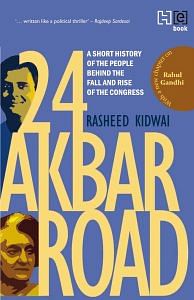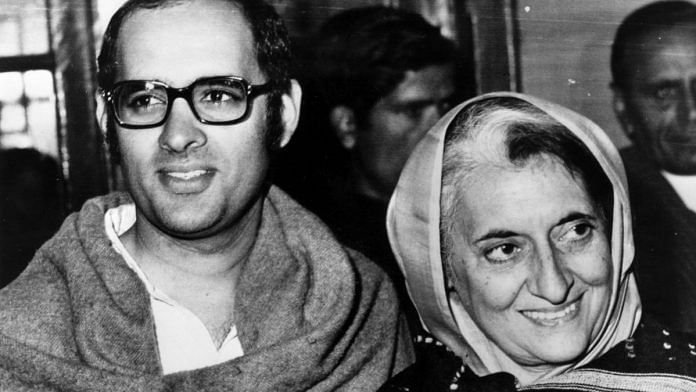Rasheed Kidwai’s book 24 Akbar Road gives readers a glimpse at the lesser known personalities of the Emergency, including Sanjay Gandhi’s associate Sultana who managed to annoy both Indira and Maneka.
Maneka Gandhi defended her husband stoutly even after she left Indira’s house and joined the right-wing BJP. According to her, the Emergency brought about order and discipline in the country. ‘There were no power failures, no strikes or lockouts, citizens went about without the fear of being mugged, robbed or raped, everything was available at reasonable prices, the slums had been cleared, the stench of open sewers abolished and, instead, clean, wholesome and cheap housing complexes raised in the suburbs, the arid desert of sand and rock turned into lush green, parks and woodland. These were only some of things that Sanjay did for his city.’
To Maneka, Sanjay had always been a caring husband. If she was feeling under the weather, Sanjay would skip Parliament to be with her. Barely three months before his untimely death, when their son Varun Feroze was to be born, Sanjay accompanied her to the All India Institute of Medical Sciences (AIIMS) and stayed by her side through the birth.
‘The AIIMS doctors later told me that he was the first man to come into the delivery room while his wife was having a baby,’ Maneka said.
Columnist Kumkum Chadha, who covered Sanjay Gandhi during and after the Emergency, recalled how once, after giving a controversial interview in which he criticized the judiciary, Sanjay called her the next day to check if she was in any trouble or needed legal help. Sanjay even sent R.K. Anand, then an upcoming lawyer who later became a Congress MP, to her house to tell her that he was only a phone call away.
Sanjay made a concerted bid to change the way politics was pursued. Sanjay questioned and troubled the established party leadership and created a parallel order in virtually every state. Even those fiercely loyal to Indira were not spared. Sanjay’s view was that unless the ‘comfort zone’ of these leaders was shaken up, the party would not excel. He experimented with new caste equations. The Nehruvian–Gandhian principles of probity in public life, simplicity, and a thrust on values were given the go-by. Indira watched with detached bemusement and a tinge of sadness, but she made little effort to check Sanjay’s style of functioning.
Sanjay’s close associate and socialite Rukhsana Sultana was one person who managed to annoy everyone from Maneka and Ambika to many of the Congress leaders. Rukhsana was an exotic character, an unabashed exhibitionist, who acted as Sanjay’s point person in Delhi’s Muslim localities. As Youth Congress president, Ambika often shared the platform with Sanjay and heaped praise on him. Rukhsana, too, never missed an opportunity to insist that Sanjay and she were ‘ice-cream buddies’, whatever that meant.
A niece of actress Begum Para and a pin-up girl of the 1950s, Rukhsana had been married to a Sikh, but her marriage did not last long. She had a boutique in Connaught Circus, from where she retailed high-end diamond jewellery on a commission basis. One day, Rukhsana was thrilled to see the prime minister’s son visit her boutique. The lady apparently had the Madame du Barry bug. When they met next, she told Sanjay that she felt highly motivated and inspired by his leadership qualities and offered to dedicate her life to his ‘cause’.
Rukhsana’s ascent was intensely disliked by Maneka, Indira, Ambika and several others, but Sanjay kept pushing her to work in the slums and in the Jama Masjid area, which is dominated by Muslims. Indira was once heard saying, ‘She (Rukhsana) is a very scatterbrained sort of person.’ Maneka said Rukhsana talked a lot of rubbish.
In the Jama Masjid area, the sight of Rukhsana, perfumed, painted and bejewelled to within an inch of her life, wearing pink spectacles, a silk sari and a low-cut choli, was a complete put-off for both men and women. But Rukhsana was not bothered by their reaction. She said her jewellery was part of her personality. ‘Why should I discard my real personality?’ she asked. More often than not, Rukhsana was seen moving about the Jama Masjid area with a handkerchief soaked in eau de cologne over her nose under her famous oversized ‘go-go’ shades. At one point, Rukhsana was allegedly paid a sum of eighty-four thousand rupees by the Union health and family welfare ministry for ‘motivating’ eight thousand men to opt for vasectomies. In June 1976, when she was supervising the demolition of many shops in the Turkaman Gate area of the walled part of Delhi, protesters faced police lathis, teargas, batons and, finally, bullets. Several people were killed.
In an interview to journalist-author Promilla Kalhan, Ambika, who was a Youth Congress functionary in Team Sanjay, criticized Rukhsana’s activities, saying she could not tolerate her presence at Indira’s residence. She recalled that she had tried to warn Indira about Rukhsana and Sanjay, but Indira chose not to take any notice. On a second occasion, Indira told Ambika to talk to Sanjay about it. Sanjay dismissed Ambika’s reservations, saying: ‘The Youth Congress needs Rukhsana, Rukhsana does not need the Youth Congress.’
 Excerpted with permission from Hachette Book Group
Excerpted with permission from Hachette Book Group



